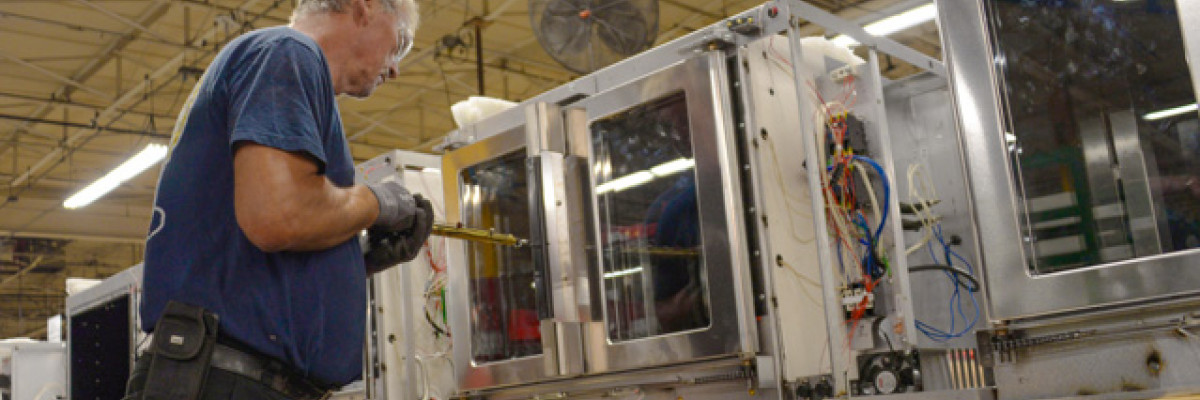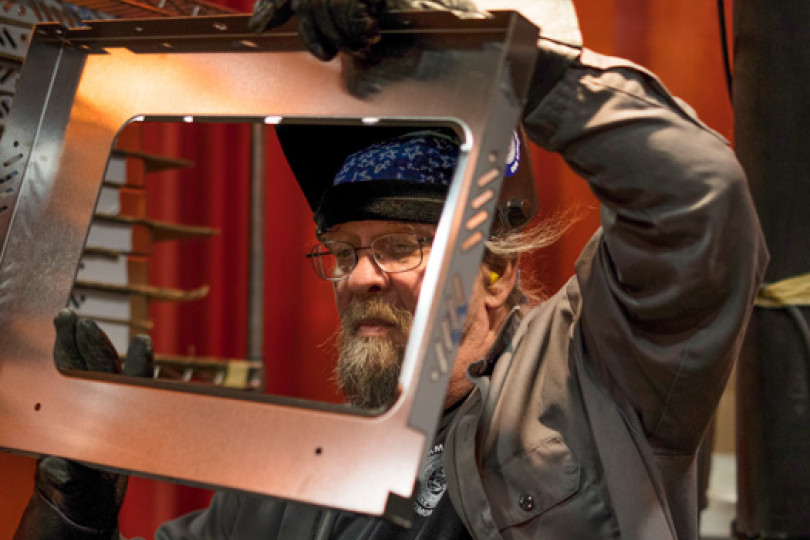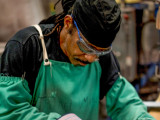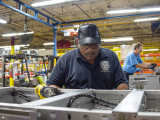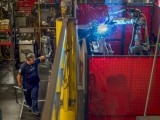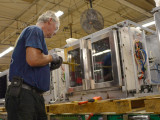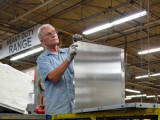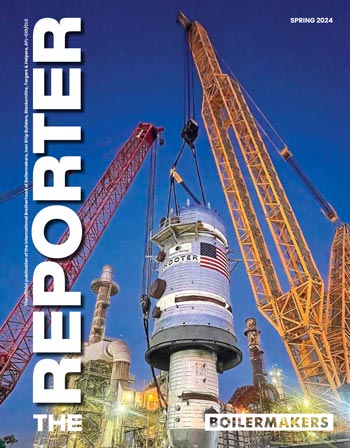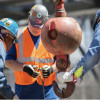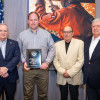Mark Campbell, fabrication TIG welder, inspects his work after TIG welding a convection oven outer door skin that will hold window glass.
View Photo Gallery (6 photos)
Local S50 makes the equipment that serves up quality
IN A HIGH-END restaurant known for its steaks, a customer anticipates the juicy porterhouse he’s ordered. He’s hungry, and as he sips a nice cabernet and chats over the appetizers, he thinks about the melt-in-your-mouth, warm-red-centered, savory-seared goodness that’s to come. It’s the most expensive item on the menu. So, the steak stakes are high: If the chef misses the mark, chances are the customer won’t be back.
But there’s no worry, because when it arrives, the meat is perfect—just as it always is.
So what does that have to do with Boilermakers? A lot, it turns out.
You see, the perfect steak doesn’t happen by accident. Getting the heat and timing right to consistently please the diverse palates of customers who like their strips, sirloins, filets and T-bones bloody, burnt and everything in between takes two things: practice and the best equipment.
And the top-of-the-line Vulcan equipment used by many top chefs in top restaurants is made by the top craftsmen and women: Boilermakers at Local S50 (Baltimore).
For L-S50, getting the Vulcan products right also doesn’t happen by accident. It takes practiced craftsmanship and the best team environment.
“The craftsmanship in this facility is instrumental to what we do. There’s not a lot of automation—most of these products are getting built by hand and put together by hand,” says plant manager Darrin Furgason. “People who pay a lot of money for a piece of equipment expect it to be perfect.”
So, whether L-S50 members are making a range, convection oven, upright over-fired broilers, or heated holding equipment; operating a forklift; tuning up a temperature control board; cutting, welding or grinding pieces in the fabrication process; or packaging the final product (L-S50 does all of that and more), perfection is the goal.
“I was so proud when I came to Vulcan—it’s the world’s finest cooking equipment,” says Danny McCartney, assembly technician. “It’s a little pride thing going there, you know—that you’re making the best.”
“When I go to a restaurant or facility, I always look to see if they have a Vulcan product in there, just so I can feel a little more pride. I might have done that one!” adds L-S50 President Wilton Barnett, who also is an assembly technician.
And since practice makes perfect, it also makes sense that many of the workers, like Barnett, are well-practiced long-time Vulcan employees. Working decades for the company is pretty standard. Barnett has worked there for 40 years, McCartney for 46. That’s the norm at Vulcan’s Baltimore facility. Many, like McCartney and Sandy Smith, started work right out of high school and plan to retire from the company. Smith, a fabrication equipment setup operator, has been there 40 years. (Of note: The Boilermakers union has been there for 65 years.)
The secret to retaining skilled craftspeople and workers? Beyond working as a union to ensure their voices are heard, members of L-S50 consistently describe the atmosphere they’ve developed at Vulcan the same way: It’s a family. And a big one at that—with about 100 Boilermakers at the facility.
“I think the main reason people like to work here is the other people,” Furgason says. “The people they work with, well, it’s like a family. You end up spending a lot of time with these people—almost more time than you do with your family at home! So, you get to form relationships with your co-workers and the management.”
“We’re one big family, we’re a union, we stick together,” affirms material specialist Vernon Jackson, L-S50’s Secretary/Treasurer and a 31-year Vulcan employee.
“Everybody just wants to be together,” Barnett adds. “It’s a camaraderie sort of thing, and everybody is always concerned about one another. Family is a strong word, and it’s a true word. That’s how we are here at Vulcan.”
Looking out for one another as a family; pride in their work. That’s what leads to Vulcan equipment that’s well-made, well-used and well-worth the price tag. It’s what motivates perfection. It’s what puts the right tools in chefs’ hands.
“It makes me proud to know I can go to a restaurant, and say, ‘Oh, I made that’ – and some of the (equipment) is 30 years old or more. So, I know I made that stove,” Smith says. “I can honestly say, we do make a quality product.
“Most of the people here go over and beyond.”
And that just might be one reason the steaks taste so good.

